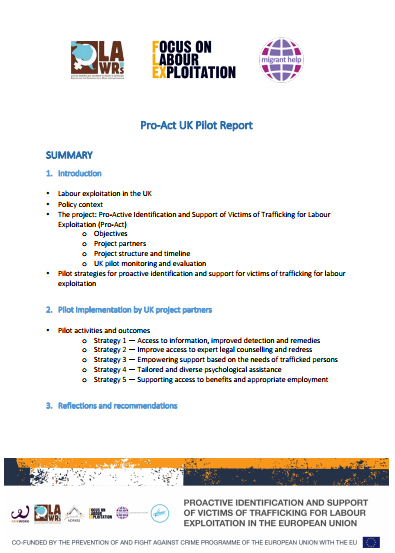This report reviews the UK pilot implementation of the “Pro-Active Identification and Support of Victims of Trafficking for Labour Exploitation (Pro-Act)” project strategies for pro active identification and support for victims of trafficking for labour exploitation, and sets out reflections and recommendations for change based on the outcomes of the project’s pilot phase.
A comprehensive response to trafficking for labour exploitation requires pro-active identification of people who have been trafficked and appropriate support for victims, in accordance with State obligations under the EU Trafficking Directive and the Council of Europe Convention on Action against Trafficking in Human Beings (the European Trafficking Convention). Pro-active identification is necessary to ensure the most hidden and vulnerable victims are detected in the full range of labour sectors. Support is important for psychological recovery, for legal redress and to ensure that trafficked persons are able to move forward safely and avoid re-trafficking.
The aim of the Pro-Act project is to improve responses to trafficking for labour exploitation throughout the EU, by developing effective EU-wide strategies for proactive identification and support of victims. The project is centred on engagement with victims of trafficking for labour exploitation and their support providers, seeking to better understand and respond to the needs and experiences of victims. Through this engagement, including primary research, national focus groups and European workshops, the project seeks to build understanding of the needs and experiences of those trafficked for labour exploitation, and develop victim-centred strategies for proactive identification and support that are transferrable across the EU.

